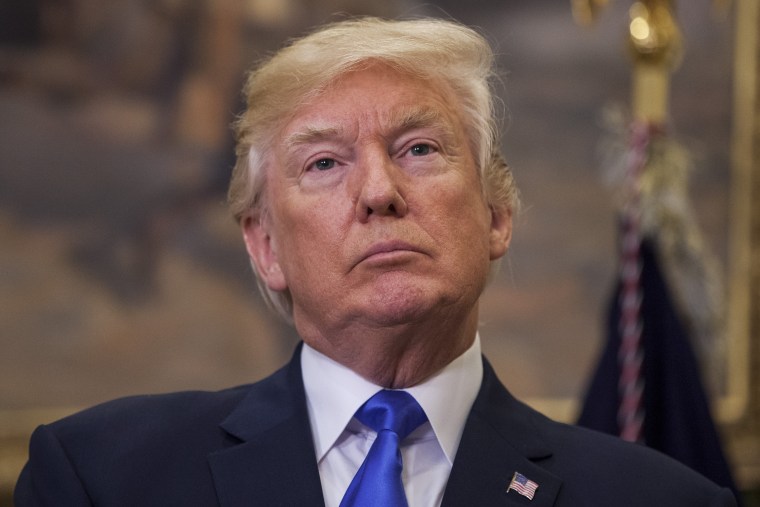Before launching his presidential campaign, Donald Trump used to whine incessantly about debt-ceiling increases. In January 2013, for example, Trump declared on Twitter, "I cannot believe the Republicans are extending the debt ceiling -- I am a Republican & I am embarrassed!" A day earlier, he wrote, "The worst negotiators in history (otherwise known as Republicans) have just offered to suspend debt ceiling for four months. Pathetic!"
It's a message that, with the benefit of hindsight, appears quite foolish, with Trump agreeing this week to extend the debt ceiling for three months, as part of negotiations in which Democrats got everything they wanted in exchange for nothing.
But Trump's evolution on the issue goes considerably further. It's not entirely clear if he knew what debt ceiling was when he used to complain about it, but this week the president declared, "Always we'll agree on debt ceiling automatically because of the importance of it."
In fact, the Washington Post reported that Trump is prepared to do away with the debt ceiling altogether.
President Trump on Thursday signaled openness to a proposal to effectively eliminate the federal limit on government borrowing, a dramatic reversal from his view as a candidate and the long-standing position of the Republican Party that the debt limit should be raised only if other steps are taken to restrain the size of government.On Wednesday, Trump and Senate Minority Leader Charles E. Schumer (D–N.Y.) reached what one senior White House official called a "gentlemen's agreement" to develop a plan that would no longer require Congress to routinely raise the limit on government borrowing.
When I say this is one of the smartest ideas Donald Trump has ever considered, I'm not being sarcastic. The debt ceiling is an incredibly dangerous tool that should not exist. If the president is inclined to get rid of it, Democrats should welcome the opportunity with vigor.
Let's back up for a minute and explain the nature of the mess. Under our system, Congress has "power of the purse" and approves federal spending, but it's the executive branch that actually allocates the funds. The debt ceiling is an artificial barrier that limits how much debt the country can owe.
In practice, this can get very messy: Congress tells the executive branch to spend money, but when that spending exceeds how much the country takes in, the executive branch then has to go back to Congress to raise the debt limit. This doesn't actually cost anything; raising the ceiling simply allows the country to cover the debts it's already accrued.
Failure to do so would result in the United States defaulting on its debts -- crashing the global economy in the process.
The obvious solution is to do what practically every other advanced economy on the planet has already done: scrap this flaw in the system.
The trouble is, most Republican leaders in Congress strongly disagree. They see value in having a political weapon around that they can use to hold the political system hostage -- as Republicans did in 2011 -- threatening to hurt the global economy unless their demands are met.
Senate Majority Leader Mitch McConnell (R-Ky.) was unusually candid on this point several years ago, boasting that his party is convinced this is "a hostage that's worth ransoming."
Indeed, when the possibility of a bipartisan compromise on this came up yesterday, I heard from a few liberals who weren't pleased for the same reason: if the debt ceiling disappeared, they said, Democrats wouldn't be able to wield the weapon, either.
But therein lies the point: the weapon shouldn't exist. It's simply too dangerous.
To be sure, this didn't use to be such a problem. The debt ceiling has been around for about a century, and for decades, policymakers treated it like routine paperwork. It was simply a procedural task Congress agreed to complete in order to prevent default, and there wasn't much of a fuss.
But as Republican politics became more radicalized, and more extreme elements in the GOP saw the value in extortion schemes, the debt ceiling went from being routine to being controversial. The idea of using the threat of default to achieve one's goals was no longer unthinkable. The patriotic norm had been shattered.
Donald Trump used to be on board with these tactics. If he's seen the light and is ready to embrace a change, it may very well be the best thing he does as president.
